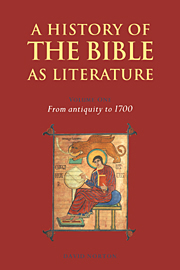Book contents
- Frontmatter
- Contents
- List of plates
- Preface
- List of abbreviations
- 1 ‘This treasure in earthen vessels’
- 2 The early Christians and biblical eloquence
- 3 Jerome
- 4 Augustine and his successors
- 5 The occult text
- 6 The challenge to the translators
- 7 Slaves of the Vulgate
- 8 Creators of English
- 9 From the Great Bible to the Rheims-Douai Bible
- 10 The King James Bible
- 11 Presentations of the text, 1525–1625
- 12 Sixteenth-century movements towards literary praise and appreciation of the Bible
- 13 The struggle for acceptance
- 14 ‘The eloquentest books in the world’
- 15 Versifying the Psalms
- 16 ‘The best materials in the world for poesy’
- Appendix
- Bibliography
- General index
- Biblical index
- Plate section
Preface
Published online by Cambridge University Press: 05 June 2012
- Frontmatter
- Contents
- List of plates
- Preface
- List of abbreviations
- 1 ‘This treasure in earthen vessels’
- 2 The early Christians and biblical eloquence
- 3 Jerome
- 4 Augustine and his successors
- 5 The occult text
- 6 The challenge to the translators
- 7 Slaves of the Vulgate
- 8 Creators of English
- 9 From the Great Bible to the Rheims-Douai Bible
- 10 The King James Bible
- 11 Presentations of the text, 1525–1625
- 12 Sixteenth-century movements towards literary praise and appreciation of the Bible
- 13 The struggle for acceptance
- 14 ‘The eloquentest books in the world’
- 15 Versifying the Psalms
- 16 ‘The best materials in the world for poesy’
- Appendix
- Bibliography
- General index
- Biblical index
- Plate section
Summary
These are truths universally acknowledged, that the Bible is one of the world's great collections of literature, and that the King James Bible is one of the finest pieces of English prose. Yet almost nothing is known of how these truths came to be. This is not because there is nothing to know, but because, in the first place, people believed that there was nothing to know. The King James Bible, since its publication, has ‘held the position of an English classic’ (Revised Version, preface): if so, what possible story could there be? None, naturally. But the truth is that the King James Bible was generally scorned or ignored as English writing for a century and a half after its publication.
This book had its origins in that fact. To read John Selden's observation from the middle of the seventeenth century that the King James Bible's language ‘is well enough so long as scholars have to do with it, but when it comes among the common people, Lord, what gear do they make of it’ was to realise that the cliché of the King James Bible's immediate success as an English classic had to be questioned. To find that Selden's was not a lone voice was to know that there was a story to be told, and to find that no one had recognised the existence of such a story, let alone told it, was to have to try to understand it and tell it myself.
- Type
- Chapter
- Information
- A History of the Bible as Literature , pp. xiii - xviPublisher: Cambridge University PressPrint publication year: 1993



